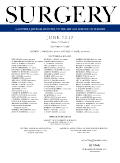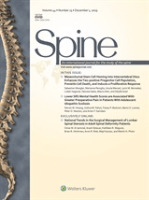
NEUROSURGERY
Scope & Guideline
Exploring the Depths of Neurosurgical Knowledge.
Introduction
Aims and Scopes
- Surgical Techniques and Innovations:
Research focused on the development and evaluation of new surgical techniques and technologies, including minimally invasive approaches, robotic assistance, and novel imaging modalities. - Neurotrauma Management:
Studies addressing the management of traumatic brain injuries, spinal cord injuries, and their outcomes, highlighting advancements in surgical protocols and rehabilitation strategies. - Neuro-oncology and Tumor Management:
Investigations into the surgical and non-surgical management of brain tumors, including gliomas and meningiomas, with emphasis on outcomes, prognostic factors, and new therapeutic approaches. - Global Neurosurgery:
Research promoting the expansion of neurosurgical care in low- and middle-income countries, including collaborative initiatives, training programs, and health policy implications. - Neurosurgical Outcomes and Patient Quality of Life:
Evaluation of factors influencing surgical outcomes, including patient-reported outcomes, quality of life assessments, and the role of social determinants in surgical success. - Clinical Trials and Methodological Innovations:
Discussion of clinical trials aimed at improving neurosurgical practices, including the application of machine learning and artificial intelligence in predicting outcomes and treatment responses.
Trending and Emerging
- Integration of Artificial Intelligence and Machine Learning:
There is an increasing trend in utilizing AI and machine learning for predictive analytics, enhancing surgical decision-making, and improving patient outcomes. - Patient-Centered Approaches in Neurosurgery:
A notable rise in research focusing on patient satisfaction, quality of life, and individualized treatment plans, emphasizing the importance of considering patient perspectives in surgical outcomes. - Neurosurgery in Global Health Contexts:
Emerging focus on global neurosurgery initiatives, addressing disparities in access to care, and enhancing surgical capabilities in low-resource settings. - Innovative Imaging and Diagnostic Techniques:
The use of advanced imaging modalities, such as intraoperative MRI and machine learning-based imaging analysis, is becoming a prominent area of research, facilitating better surgical planning and outcomes. - Telemedicine and Remote Monitoring:
The growing importance of telemedicine in neurosurgery, particularly in the context of the COVID-19 pandemic, is being recognized as a vital tool for patient management and follow-up.
Declining or Waning
- Traditional Neurosurgical Techniques:
Research on conventional neurosurgical techniques may be waning as the field increasingly embraces minimally invasive and robotic approaches that promise better outcomes and lower complications. - General Anesthesia in Neurosurgery:
As more studies highlight the benefits of regional anesthesia and sedation techniques, the focus on general anesthesia during neurosurgical procedures appears to be decreasing. - Rural Neurosurgery Practices:
There seems to be a reduced emphasis on research specifically addressing neurosurgical practices in rural settings, potentially overshadowed by broader discussions on global health and urban neurosurgery. - Long-term Follow-up of Older Techniques:
Older surgical techniques and their long-term outcomes are receiving less attention, with a shift toward newer, more innovative approaches that promise improved patient care.
Similar Journals

Indian Journal of Neurosurgery
Fostering Collaboration for Cutting-Edge Neurosurgical SolutionsIndian Journal of Neurosurgery, published by GEORG THIEME VERLAG KG, serves as a pivotal resource in the field of neurosurgery and clinical neurology. With an ISSN of 2277-954X and E-ISSN 2277-9167, this Open Access journal has made significant strides since its transition to an accessible format in 2012, ensuring that groundbreaking research is available to the global scientific community. The journal, situated in Stuttgart, Germany, aims to publish high-quality and innovative research, reviews, and discussions that address contemporary challenges in neurosurgery. Despite its recent ranking of 465/551 in Medicine (Surgery) and 361/400 in Medicine (Neurology - clinical), with percentiles of 15% and 9% respectively, the Indian Journal of Neurosurgery fosters a platform for emerging ideas that can propel advancements in neurosurgical practices. Researchers, professionals, and students are encouraged to contribute to and benefit from this dynamic publication, which continues to influence the evolution of neurosurgical knowledge and practices.

SURGERY
Shaping the future of surgery with authoritative knowledge.SURGERY, an esteemed journal published by MOSBY-ELSEVIER, stands at the forefront of medical literature in the field of surgical practices and innovations. With a rich history dating back to its inception in 1937, this journal has consistently provided cutting-edge research and comprehensive reviews aimed at enhancing surgical outcomes and techniques. It proudly holds a prestigious Q1 classification in Surgery as per the 2023 category quartiles, ranking #68 out of 551 in the Scopus database, placing it in the top 87th percentile within its category. This makes SURGERY an essential resource for researchers, practitioners, and students alike, providing valuable insights and advancements that shape surgical methodologies around the globe. Although it is not an open-access journal, its authoritative content and accessibility through institutional subscriptions ensure that the latest surgical research is available to scholars and healthcare professionals. Engage with a community dedicated to excellence in surgical science and practice through SURGERY, where every article contributes to the progression of medical knowledge and patient care.

Turkish Neurosurgery
Fostering Collaboration in Clinical Neurology and SurgeryTurkish Neurosurgery is a distinguished journal published by the TURKISH NEUROSURGICAL SOC, dedicated to advancing the field of neurosurgery and clinical neurology. With an ISSN of 1019-5149 and converging its focus from 1990 to 2024, this regional journal aims to bridge the gap in knowledge dissemination within Turkey and beyond. It holds a notable position in the academic community, categorized in the Q3 quartile for both Neurology (clinical) and Surgery in 2023, illustrating its relevance in these critical fields. Although currently not an open-access publication, it offers insights and research findings that are vital for researchers, practitioners, and students who seek to stay abreast of developments in neurosurgical practices. Located in Ankara, Turkiye, Turkish Neurosurgery provides a platform for sharing rigorous research that enhances clinical outcomes and informs surgical techniques, thus playing a crucial role in elevating the standards of neurosurgery in the region.

CLINICAL NEUROLOGY AND NEUROSURGERY
Transforming Clinical Knowledge into Surgical ExcellenceCLINICAL NEUROLOGY AND NEUROSURGERY, published by Elsevier, is a pivotal journal in the fields of neurology and neurosurgery, recognized for its rigorous peer-review process and commitment to advancing clinical practices. Established in 1974, the journal has become a respected source of innovative research, evidenced by its excellent Scopus rankings—placing it within the top half of journals in both Medicine (Surgery) and the clinical aspect of Neurology. Notably, it has achieved a Q2 ranking in both Medicine (miscellaneous) and Surgery, and Q3 in Neurology (clinical) as of 2023. The journal publishes a wide array of articles focused on the latest findings, clinical practices, and technological advancements that address neurological disorders and surgical interventions. While it does not currently operate under an open-access model, it remains highly accessible to academic institutions and professionals worldwide from its editorial base in the Netherlands. By enabling knowledge-sharing and fostering collaboration among researchers, practitioners, and students, CLINICAL NEUROLOGY AND NEUROSURGERY plays a crucial role in shaping the future of clinical neurology and surgical techniques.

Egyptian Journal of Neurosurgery
Unlocking the Mysteries of the Brain and SpineWelcome to the Egyptian Journal of Neurosurgery, a leading publication in the field of neurosurgery, meticulously curated by SPRINGERNATURE. With an E-ISSN of 2520-8225, this journal has been committed to advancing the understanding of neurosurgical practices since embracing Open Access in 2018, ensuring widespread accessibility of groundbreaking research and clinical insights. Based in London, England, at CAMPUS, 4 CRINAN ST, LONDON N1 9XW, the journal aims to bridge gaps in neuroscience research, providing a platform for innovative studies, systematic reviews, and case reports. By publishing high-quality, peer-reviewed articles, the Egyptian Journal of Neurosurgery aims to equip researchers, professionals, and students with the knowledge and tools necessary to enhance patient care and outcomes in neurosurgical practices globally. Join our vibrant community of scholars dedicated to exploring the complexities of the brain and spine, and contribute to the evolving narrative of neurosurgery.

Brazilian Neurosurgery-Arquivos Brasileiros de Neurocirurgia
Connecting Global Minds in NeuroscienceBrazilian Neurosurgery-Arquivos Brasileiros de Neurocirurgia, published by GEORG THIEME VERLAG KG, is a distinguished peer-reviewed open access journal that has been making significant contributions to the field of neurosurgery since its transition to open access in 2015. This Brazilian journal, which is accessible to a global audience, aims to disseminate high-quality research articles, reviews, and case reports that enhance the understanding and practice of neurosurgery and clinical neurology. Despite its current ranking in the Q4 category for both neurology and surgery in 2023, the journal is committed to improving its impact and accessibility for researchers, medical professionals, and students worldwide. As an important platform for innovative ideas and discussions, it takes pride in publishing scientifically rigorous content that informs and shapes the future of neurosurgical practices. With the rise of open access publishing, Brazilian Neurosurgery aligns itself with contemporary trends, making vital research readily available to its diverse readership while nurturing academic collaborations within the neurosurgical community.

SPINE
Leading the way in spine-related clinical innovation.SPINE, published by Lippincott Williams & Wilkins, is a leading academic journal in the fields of Orthopedics, Neurology, and Sports Medicine. Established in 1976, this reputable journal has made significant contributions to advancing clinical and scientific knowledge, with its impactful research evidenced by its prestigious Q1 classification across three essential categories in 2023 and a notable ranking of #51 in Orthopedics and Sports Medicine and #117 in Clinical Neurology as per Scopus. SPINE aims to disseminate high-quality research articles, reviews, and clinical studies that address cutting-edge topics and challenges in spine-related health, thereby serving as an invaluable resource for researchers, healthcare professionals, and students alike. With its commitment to rigorous peer review and a wide readership, SPINE continues to be at the forefront of innovations in spine health & disease from 1976 to 2024, upholding its reputation as a catalyst for progress in the medical community.

Operative Neurosurgery
Pioneering Research for Optimal Patient Outcomes.Operative Neurosurgery is a distinguished peer-reviewed journal published by Lippincott Williams & Wilkins, focusing on the rapidly evolving fields of neurology and surgery. With an ISSN of 2332-4252 and an E-ISSN of 2332-4260, this journal serves as a vital platform for disseminating high-quality research, clinical studies, and innovative practices from 2012 through 2024. As of 2023, it holds a reputable position in category quartiles—Q3 in clinical neurology and Q2 in surgery—demonstrating its commitment to contributing to the scientific community. The journal's placement in the Scopus rankings also reflects its significance, with a ranking of #177 out of 551 in surgery and #229 out of 400 in clinical neurology. Although it operates under a traditional subscription model, the journal remains dedicated to enhancing access to pivotal information that shapes operative techniques and patient outcomes, making it an essential resource for researchers, surgeons, and clinicians alike. Through rigorous peer review and a commitment to academic integrity, Operative Neurosurgery invites contributions that advance knowledge and foster further exploration within these crucial fields.

Neurospine
Fostering accessibility in spinal neuroscience for all.Neurospine, an esteemed journal published by the Korean Spinal Neurosurgery Society, stands at the forefront of spinal neuroscience and surgery, providing an indispensable platform for cutting-edge research and clinical advancements since its inception. As an Open Access journal, it fosters global collaboration and accessibility, empowering researchers and medical professionals alike to share influential findings across the scientific community. With a remarkable impact factor and consistently ranking in the Q1 category for both Neurology (Clinical) and Surgery, Neurospine is lauded for its high-quality publications, evidenced by its considerable Scopus rankings—#56 in Medicine & Surgery and #122 in Medicine & Neurology (Clinical). It plays a critical role in disseminating impactful research, clinical practices, and innovative methodologies from 2018 to 2024, ensuring the continuous evolution of knowledge in spinal health. The journal serves as a vital resource for academic scholars, healthcare providers, and students committed to advancing patient care and surgical outcomes within the realm of neurology and spinal surgery.

Egyptian Journal of Neurology Psychiatry and Neurosurgery
Pioneering Insights for a Healthier Mind and BrainEgyptian Journal of Neurology Psychiatry and Neurosurgery, published by Springer, is a premier open-access journal that has been dedicated to advancing the fields of neurology, psychiatry, and neurosurgery since its inception in 2009. With an E-ISSN of 1687-8329, this journal aims to provide a dynamic platform for researchers and clinicians to disseminate their findings, fostering a rich dialogue on the latest developments and innovations within these critical disciplines. With an impactful open-access model adopted since 2018, the journal attracts a global audience, facilitating the exchange of knowledge and ideas across various medical and scientific landscapes. In the 2023 rankings, it holds impressive positions within the Q3 category for Neurology (clinical), Psychiatry and Mental Health, and Surgery, as well as Q4 in Miscellaneous Neuroscience, highlighting its value within the field. As a valuable resource for both budding scholars and seasoned professionals, the Egyptian Journal of Neurology Psychiatry and Neurosurgery offers insights that drive progress in the treatment and understanding of neurological and psychiatric conditions.